HMCS Iroquois Was To Have Led International Fleet In Gulf
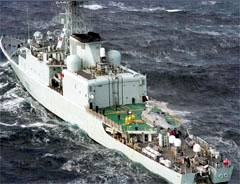 The quick reactions of the crew on a Canadian Navy
Sea King helicopter that crashed on HMCS Iroquois' deck Thursday
helped avert a much worse tragedy, according to two officers who
witnessed the near-tragedy.
The quick reactions of the crew on a Canadian Navy
Sea King helicopter that crashed on HMCS Iroquois' deck Thursday
helped avert a much worse tragedy, according to two officers who
witnessed the near-tragedy.
Maj. Todd Smart, the officer in charge of the ship's helicopter
detachment, told reporters he watched in shock as the helicopter
lost engine power and began a rapid descent back to the deck.
"My stomach dropped out from under me. These are the guys that
were on my detachment, on my watch," he said.
Good Training, Good Reaction
Later, he realized that the pilot's quick actions in shutting
down engines and successfully guiding the 9,200-pound aircraft back
onto the destroyer's deck had prevented further tragedy.
"The pilot was taking action to minimize what was going to
happen. He recognized that he had lost power and that he was
descending," said Smart.
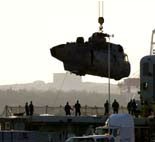 The major watched with relief as the four air crew
scrambled to safety. A firefighting team rapidly moved through heat
and smoke to eliminate the chances jet fuel would explode and
burn.
The major watched with relief as the four air crew
scrambled to safety. A firefighting team rapidly moved through heat
and smoke to eliminate the chances jet fuel would explode and
burn.
"The crew, all prepared, all well trained, did great work to get
out when they did. All stuff we trained for, all stuff that
happened perfectly," said Smart.
The crash happened just a few seconds after a Thursday morning
takeoff from the Iroquois, which was on its way to become the
flagship for a Canadian-led task force monitoring the Persian Gulf
for terrorist activity.
The ship arrived back quietly at the Shearwater base jetty on
Saturday, greeted by a team of eight safety investigators and
media. Families of the air crew waited to greet them in a nearby
hangar.
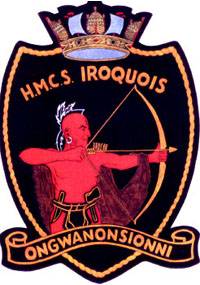 A huge crane offloaded the damaged helicopter and
a truck carried it to a nearby hangar for examination by the
military crash investigators.
A huge crane offloaded the damaged helicopter and
a truck carried it to a nearby hangar for examination by the
military crash investigators.
The helicopter lay on its side on the flight deck, its rear tail
rotor ripped off, a satellite system torn open and one of its front
windows smashed. Next to it, the right wheel assembly laid on the
deck.
The metal cowling covering the right engine had been torn off,
exposing the jet engine to the elements.
The damage occurred in a matter of seconds, said Smart, a
veteran pilot, who watched from the bridge as the 40-year-old Sea
King fell.
"I think I set the land-speed record to get back to the hangar
to see what was going on," he said.
A Bad Day, But A Great Day
Ground crew also were on the scene rapidly and followed
procedures almost flawlessly, said Capt. Paul Maddison, the ship's
commander.
"Thursday was a bad day at sea, yet it was also a great day at
sea," he said.
"The crew derived a great deal of self confidence from this
accident in that all of the exercises they had done for such an
emergency were proven in spades."
Still, he added, the crew required a day to "get over the
initial shock of having the
The crash of a Sea King onto the deck of a Canadian destroyer had
nothing to do with the helicopter's age, the head of Canada's air
force said on Friday.
"Regardless of the age of these things, we fly safe airplanes,"
said Lt.-Gen. Lloyd Campbell.
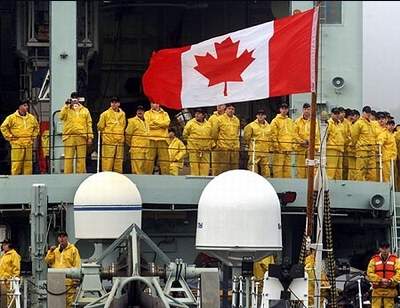
Canadian Forces Debate Over Sea King Replacement
Re-ignited
The incident has embarrassed the military, as the ship was en
route to the Persian Gulf to be the command ship of an
international fleet.
Campbell said the helicopter that crashed was overhauled four
months ago, and had new engines on board. "We're not sure what
caused the difficulty," he said.
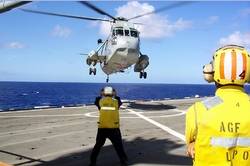 He said the 40-year-old helicopters are safe even
though there have been 12 crashes, 10 crew members killed and
numerous equipment malfunctions.
He said the 40-year-old helicopters are safe even
though there have been 12 crashes, 10 crew members killed and
numerous equipment malfunctions.
"Those accidents that we've had with the Sea King have actually
been evenly balanced over (the decades)," he said.
But the opposition in Ottawa isn't buying that line.
"Just imagine the difference in technology between a 1963 car
and a 2003 car, or television set or anything," said Bill Casey,
the Tory defence critic.
The Canadian Alliance jumped on the fact that the Liberals
killed a deal to replace the Sea Kings a decade ago, as soon as
they took office.
Since then, the process of replacing the helicopters has been
caught in a bureaucratic quagmire.
"Why does this prime minister continue to put saving face before
saving lives?" asked Deborah Grey, of the Canadian Alliance.
Chrétien: It Comes Down To Money
 During a news conference in Mexico Friday, Prime
Minister Jean Chrétien defended his government's decision to
scrap the helicopter deal in 1993. He said at the time, the
Liberals were grappling with a $42-billion deficit.
During a news conference in Mexico Friday, Prime
Minister Jean Chrétien defended his government's decision to
scrap the helicopter deal in 1993. He said at the time, the
Liberals were grappling with a $42-billion deficit.
"We could not afford to buy new helicopters at that time, so we
said No to the deal that had been negotiated before," he said. "And
now we are in the process of buying new ones."
The Iroquois is expected to reach Halifax on Saturday, and
undergo a few days of repairs before heading back out for duty in
the Persian Gulf.
Until it gets there, the frigate Montreal will serve as the
fleet command vessel.
 ANN's Daily Aero-Linx (04.30.25)
ANN's Daily Aero-Linx (04.30.25) ANN FAQ: Turn On Post Notifications
ANN FAQ: Turn On Post Notifications Classic Aero-TV: Agile Aeros Jeff Greason--Disruptive Aerospace Innovations
Classic Aero-TV: Agile Aeros Jeff Greason--Disruptive Aerospace Innovations Aero-News: Quote of the Day (04.30.25)
Aero-News: Quote of the Day (04.30.25) ANN's Daily Aero-Term (04.30.25): Expedite
ANN's Daily Aero-Term (04.30.25): Expedite








